New Discounts, Coupons & Promotions - Black Friday USA
In USA Black Friday is by far the biggest shopping event of the year. It always falls on the Friday after the Thanksgiving in the USA which occures on the 29th of November this year.

Walmart Black Friday 2023 Up to 50% OFF
Get ready for Walmart's Black Friday! Enjoy up to 50% off on electronics,...
- 60%

Even 80% OFF Amazon Black Friday 2023 Sale
Enjoy up to 80% off on electronics, fashion, and more! Shop Amazon's Black...
- 80%

Up to 40% OFF Nike Black Friday 2026
Shoes, clothing, and more on sale! Enjoy even 40% off!
- 40%

Petco Black Friday 2026 Dealspage
Visit this page when Black Friday comes on! Massive savings will be waiting for...
- 50%

Staples Daily Deals - Don't Wait For Black Friday 2023
Save up to 50% with Staples daily deals on office essentials, laptops and more!
- 50%

Deals Center - Up to 50% OFF Office Depot Black Friday 2023
Waiting for Black Friday? Check out Office Depot's deals center and save even...
- 50%

PCs & Laptops Up to 50% OFF Dell Black Friday 2023
Shop PCs & laptops saving up to 50%! Click to find the deals.
- 50%

JCPenney Coupons & Promo Codes!! Black Friday 2023
Want to save before Black Friday on JCPenney? Go to the landing page now to find...
- 60%

Save Before Black Friday 2023 Fashion Up to 50% OFF
Hundreds of clothing items for women, men, and kids on sale! Don't wait for...
- 50%
Black Friday: facts and numbers
- In the United States and around the world, the next Black Friday will take place on 24 November 2023;
- The peak of shopping activity takes place at midnight and 2 pm;
- During Black Friday, an average American buys 4 products;
- Americans are planning on spending around $485 per person in both online and brick-and-mortar stores.
In the autumn and winter season, Black Friday sale plays an important role not only in terms of e-commerce turnover but also the activity of shoppers. With the beginning of November, small and middle-sized businesses, as well as bigger players on the market, begin Black Friday preparations. They announce huge sales to take place at the end of November, in both online and brick-and-mortar stores.
Curiously enough, merchants claim that this is not entirely about the fight for increasing their sales. In a sense, sellers and buyers swap places during Black Friday. In normal circumstances, customers gain benefits by shopping regularly and thus asserting their loyalty. In November, stores are the ones that must prove loyalty toward their clients, which can be assessed with regard to the level of rebates and availability of highly discounted products.
For several years, Black-Friday.Global analysts have been closely following Black Friday trends in the United States and around the world. Below, we present a handful of statistics and interesting facts connected with the busiest shopping day in the world.
Black Friday: trends in the past years
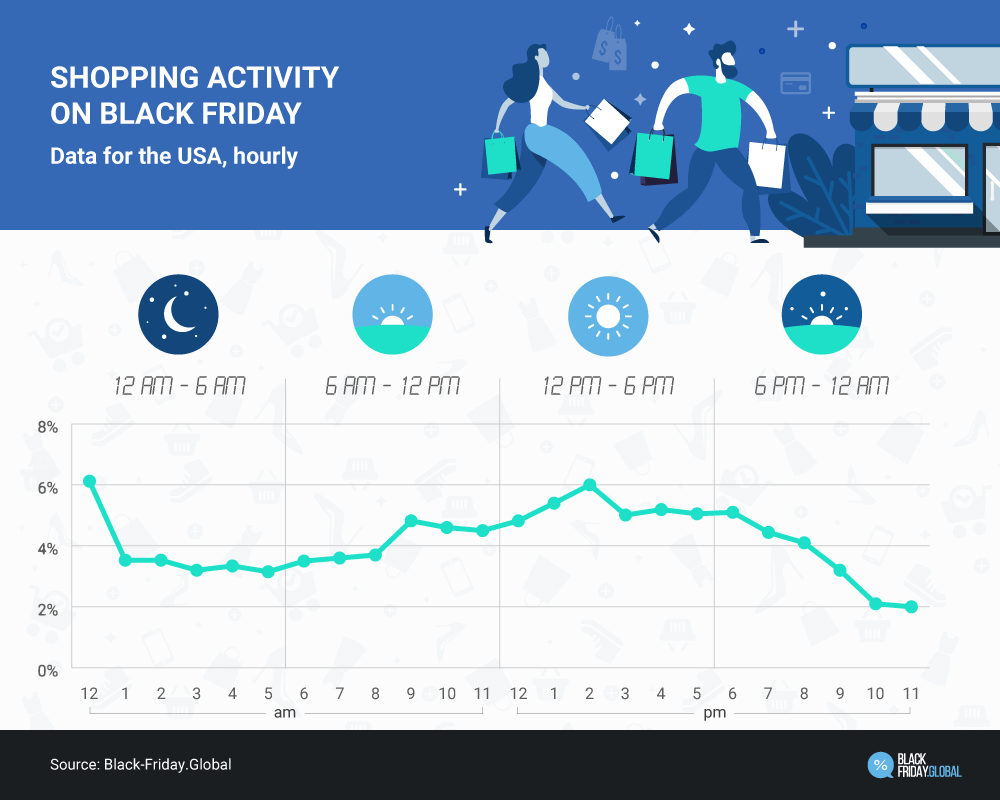
In the beginning, Black Friday used to be a one-day happening in the United States. However, over the past few years, the event has grown into a shopping marathon that lasts for several days. It may sometimes start on Thursday and continue until the end of the week, or even month. In an attempt to grab consumers’ attention, some stores start the so-called presales as early as Monday. Nevertheless, in most countries, the peak of shoppers’ interest falls on the same day. In the United States, Google Trends data for 19-25 November 2018 shows that one third of all queries related to Black Friday sales were recorded on Friday (35.3 percent). Nevertheless, the interest of customers starts to grow on Wednesday and fades on Sunday. This tendency is characteristic for not only the US but other countries as well.
The research conducted by Black-Friday.Global in 2018 shows that 100 percent of surveyed Americans are aware of the existence of Black Friday. However, not all of them were able to recall the exact date, which may explain the gradual increase of interest in this event even a few weeks before it takes place (Google Trends).
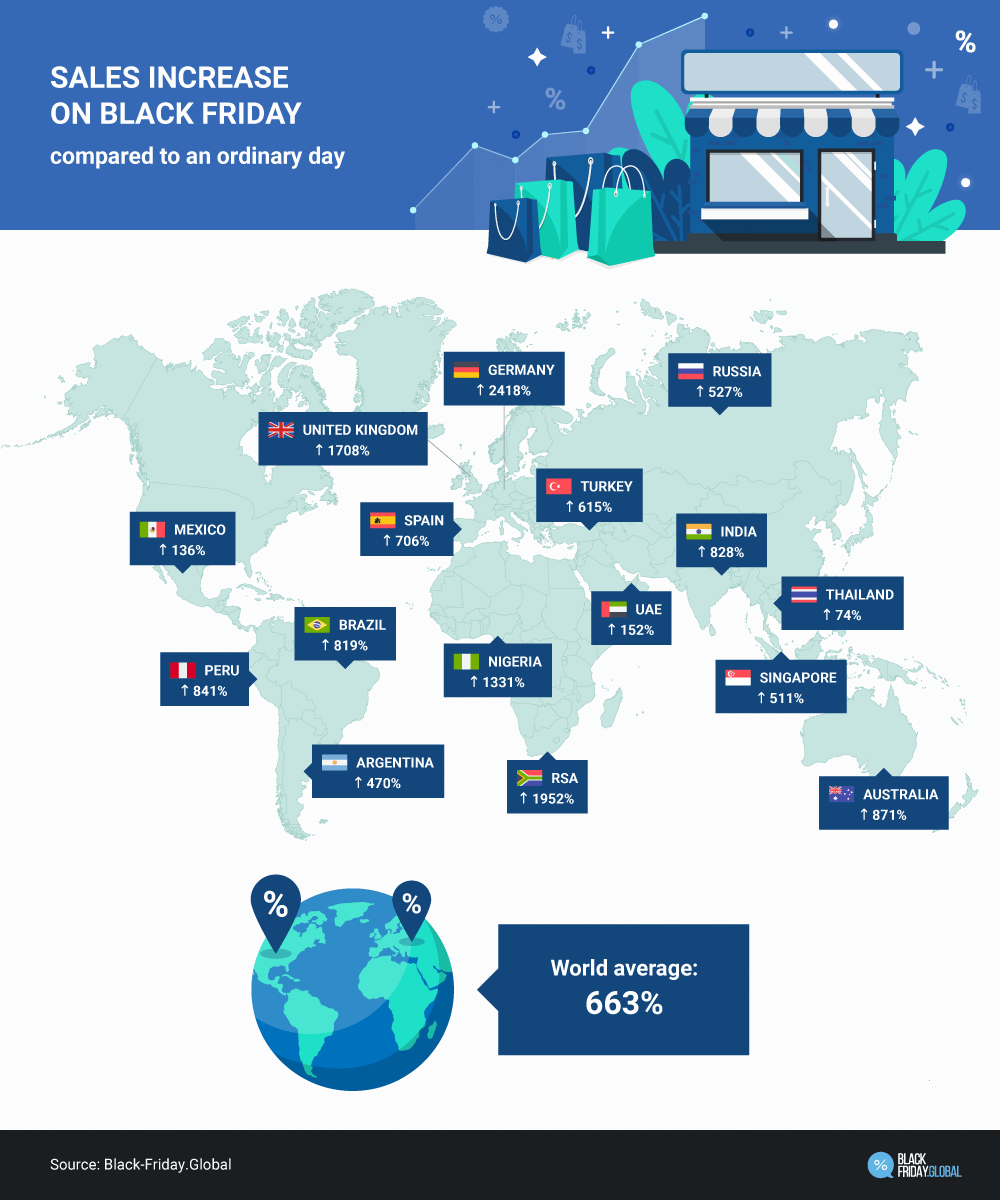
The internal Black-Friday.Global data for 2018 in the United States shows a 2063 percent increase in sales compared to an ordinary day. Such high numbers are not uncommon in other countries as well. For example, in the United Kingdom the increase is 1708 percent, in Canada — over 1886 percent, and in Germany — over 2418 percent.
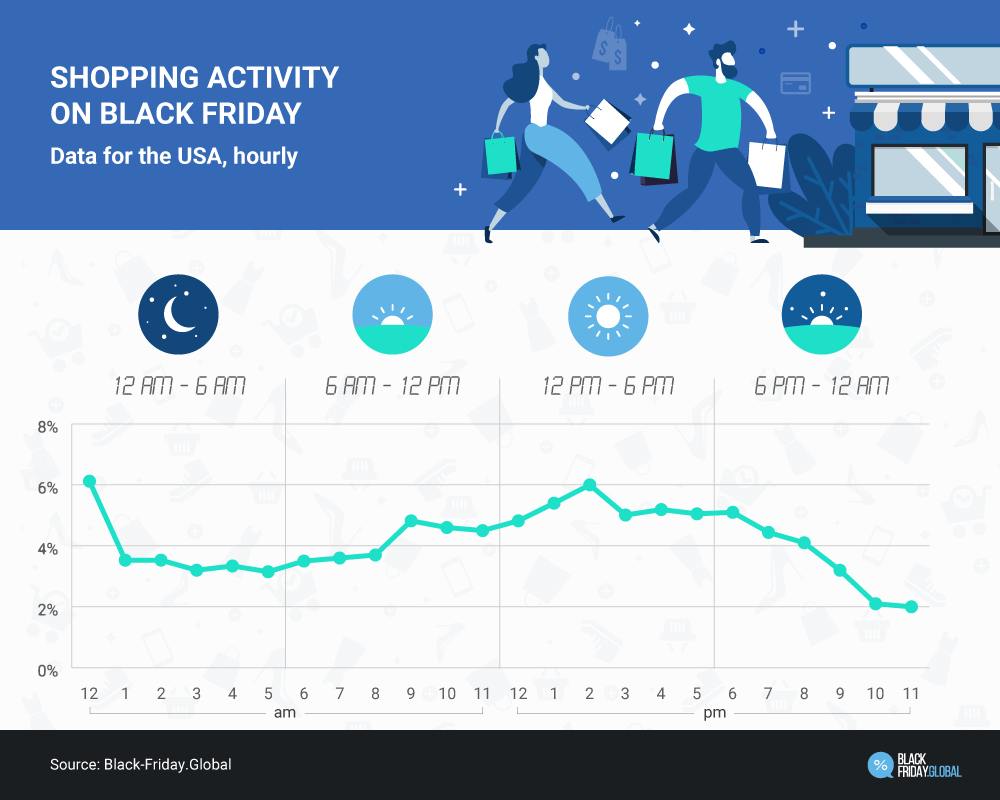
Unlike the United States, citizens of other countries do not usually have a day off on Black Friday. Although peaks of online shopping activity in various countries are slightly different, generally they fall on the morning and evening. On the American Internet, the intensity of shopping was distributed quite evenly between 9 am and 7 pm, with peaks at midnight and 2 pm according to Black-Friday.Global data for 2018.
In countries like Turkey, Finland, Greece, Singapore, or Hong Kong, Black Friday seems to have been much-anticipated — basing on the fact that most of the shopping was done right after midnight.
Level of discounts versus shoppers’ expectations
Statistical data from the past few years show that an average Black Friday discount in the United States has slightly decreased (from 68 percent in 2017 to 66 percent in 2018). Interestingly, these numbers are similar to expectations of American consumers (who get ready for 70 percent markdowns).
Shoppers from Belarus, Greece and Peru also expect high price reductions (62 percent). Unfortunately, local stores are only able to offer discounts which are 8-10 percentage points lower than those anticipated by customers. On the other hand, monitoring the deals from stores in Ukraine, RSA and the Philippines shows that merchants in these countries are prepared to offer far more attractive discounts, exceeding the expectations of shoppers.
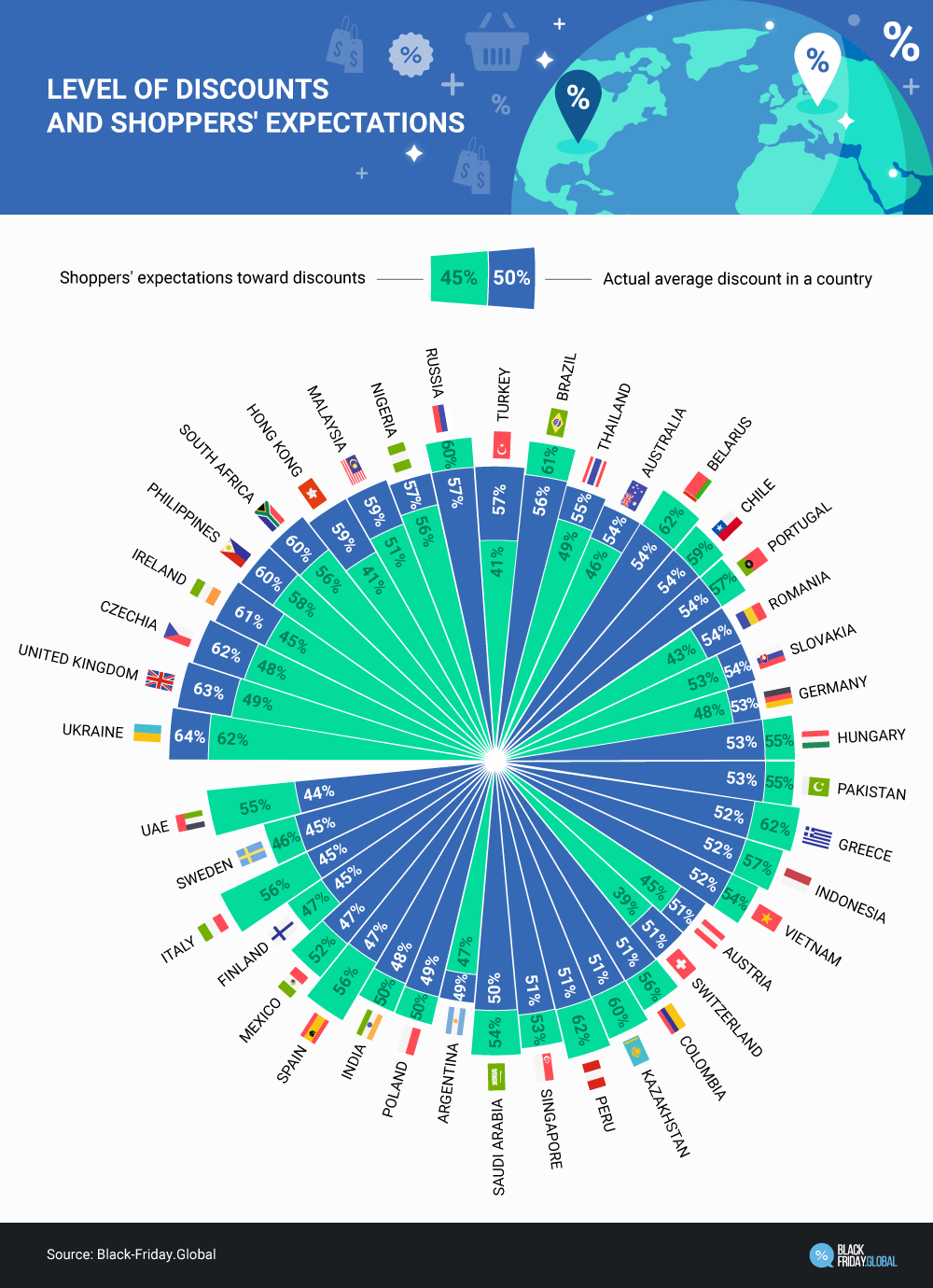
Top products bought by Americans
According to the survey, among Americans who are going to take part in the Black Friday frenzy, 45 percent already know what to buy. As for the number of purchased items, Americans are going to buy 4 on average. Past years’ statistics indicate that the most popular categories of products among Black Friday shoppers in America are clothing, shoes, electronics, home and garden, as well as home appliances.
Around the world, widely-understood fashion products take the lead during Black Friday. Nonetheless, in some countries like Brazil, Switzerland, India, Malaysia, or Romania, electronics prevail in shopping carts.
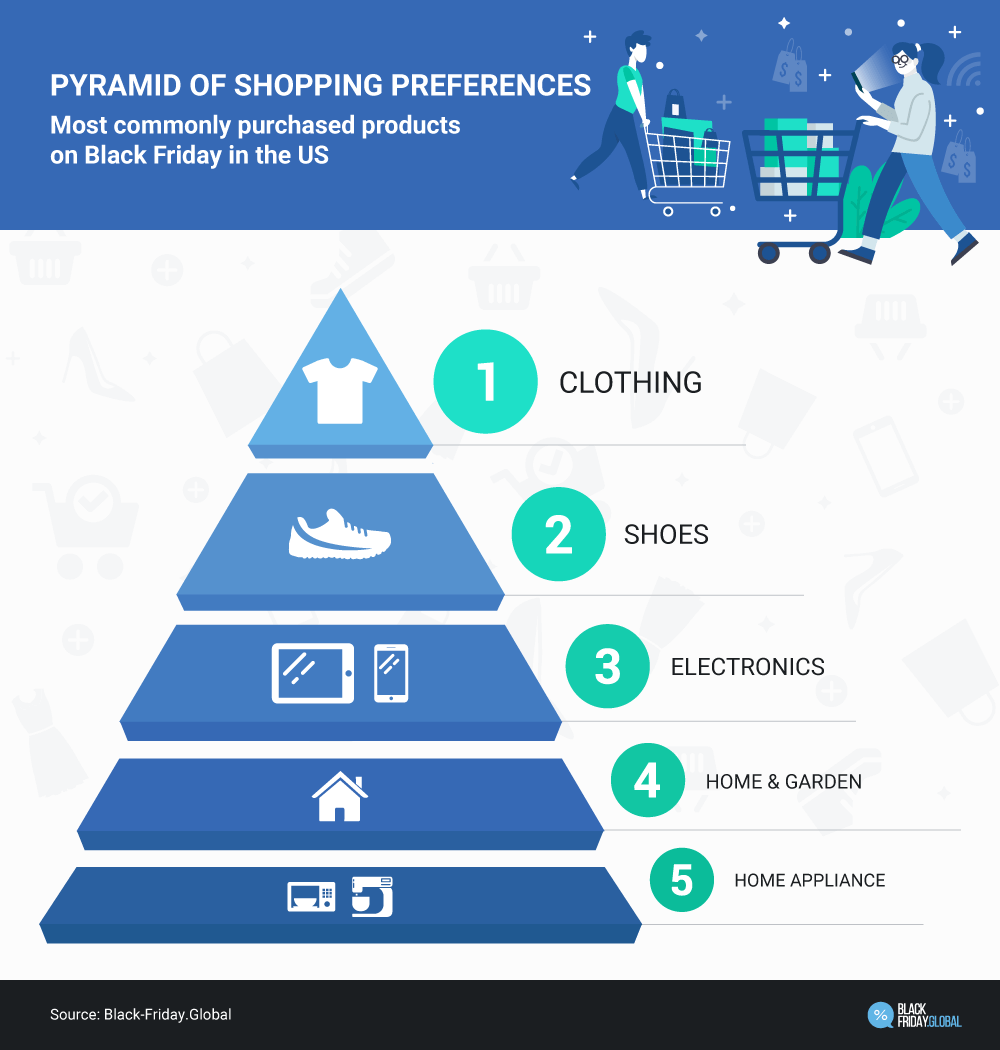
Black Friday spending
Americans are planning on taking part in both online and brick-and-mortar sales. Those who will choose more than one channel are ready to spend around$485. In other countries, shoppers have a smaller budget in mind, like Germans ($238), Singaporeans ($174) or Hongkongers ($83). Consumers who — similarly to Americans — declare to spend record-breaking amounts come from Canada ($430), the United Kingdom ($397), Ireland ($339) and the United Arab Emirates ($291).
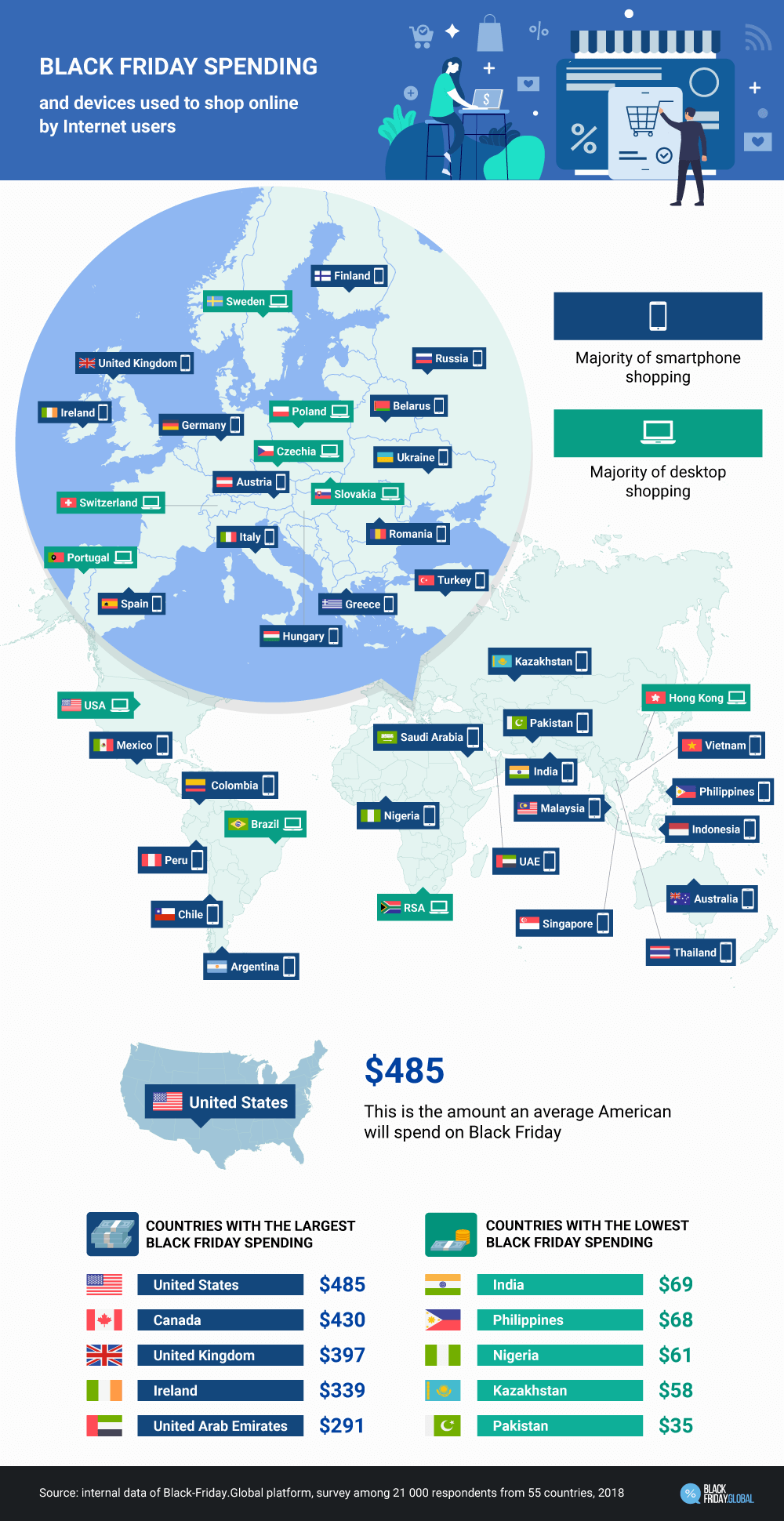
According to the data from 2021, when shopping online during Black Friday, more than half (56.8 percent) of American customers used desktops, 40.5 percent preferred desktops, and the remaining 2.8 percent chose tablets. In most countries, purchasing with smartphones took the lead, noted among others in the United Kingdom, Germany, Turkey, or Indonesia.
Methodology and data source
All statistical data comes from Picodi.com, a global discount platform operating since 2010, which created Black-Friday.Global, a site dedicated to Black Friday sales. The surveys conducted in July and November 2018 among 21 thousand respondents from 55 countries were also used in the report. For currency conversion, we used the average exchange rate from xe.com.
Public Use
Share information about Black Friday with your readers! All the data and infographics presented in this report can be freely used for both commercial and non-commercial purposes as long as you indicate the author of the research (Black-Friday.Global) with a link to this subpage.

Black Friday 2023 in the United States
This event, known previously only in the States, has gained a truly worldwide popularity within just a few years. In the US – 100% of respondents know what Black Friday is.
Black-Friday.Global Analysis Team has been closely following this trend for the past several years. We know exactly how relevant this event is for retailers, the domestic and local economy, as well as for average consumers.
How is the interest in shopping and discounts growing among Americans in November? Which categories of goods are characterised by the highest demand? How much money do Americans spend during Black Friday shopping craze and how are they different from the other nations? We’ve analyzed Black Friday statistics and conducted surveys in 55 countries to answer the above questions. Here are the results of our analysis.
Global Recognition
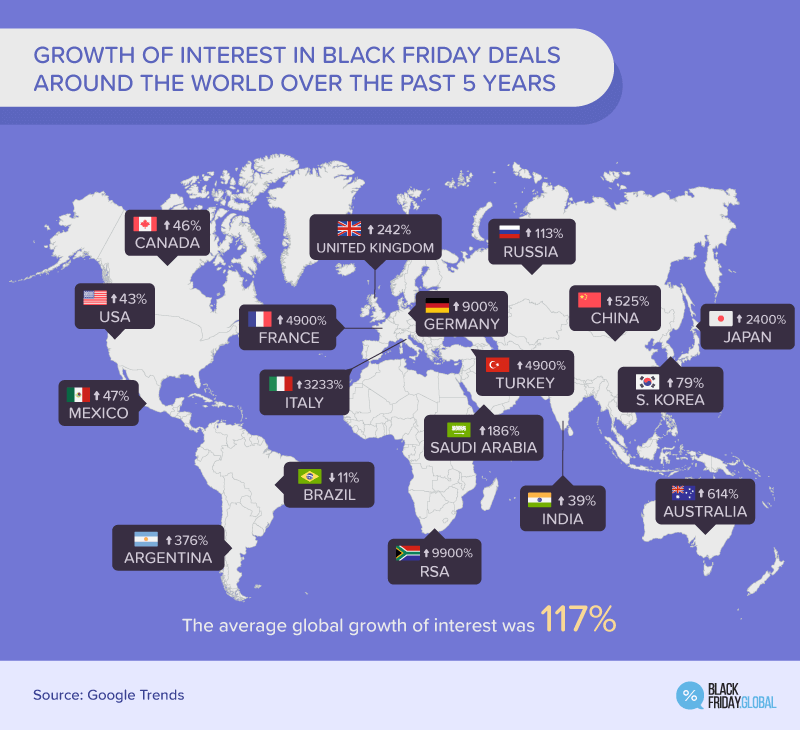
Black Friday is now a phenomenon for a reason. Google’s data suggests that in the last 5 years the interest of Internet users in this event has more than doubled. Every year, in almost every country, the shopping fever results in new sales records. Only in Western Hemisphere countries, where trends from the US appear faster, a moderate increase in Black Friday discounts is noted.
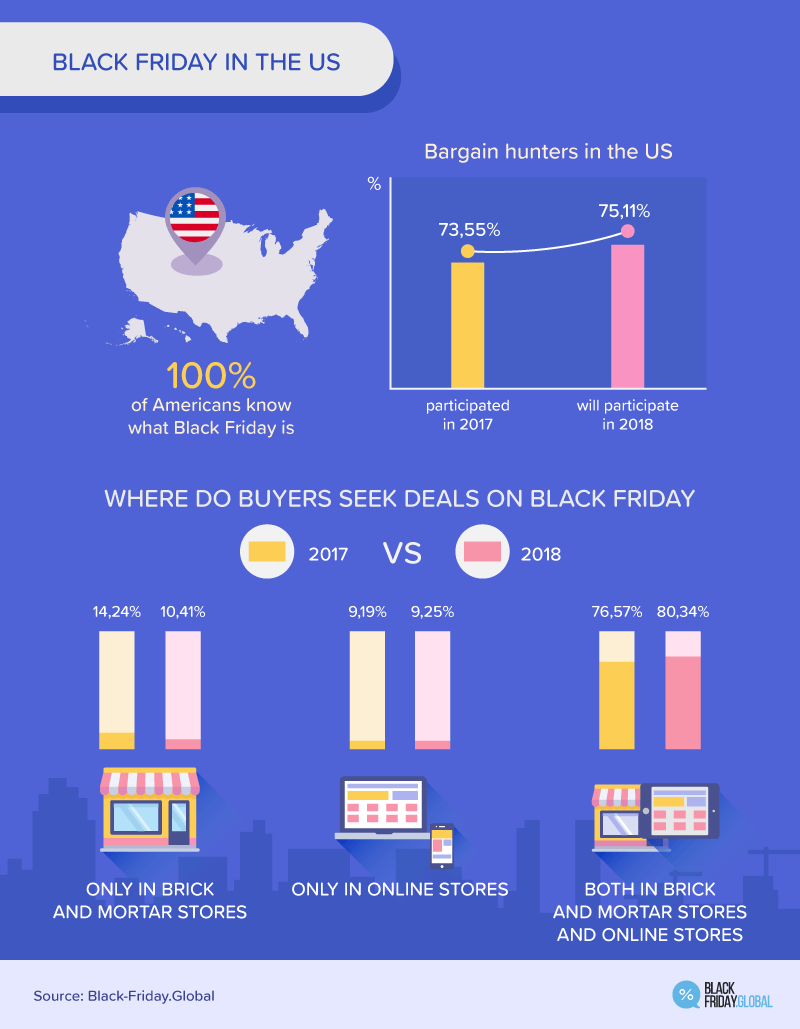
Over the past 5 years, the popularity of this shopping event has been growing consistently. The survey suggests that 3 out of 4 Americans will participate in Black Friday this year (an increase of 2 percentage points compared to 2017). The vast majority of consumers will shop both online and offline (80%), the rest will either opt for traditional offline-only (10%) or online-only (10%) option. For comparison, in 2017 the percentage of users choosing brick and mortar stores only was higher by almost a half (from 14.3% to 10%).
Boosting The Global Economy
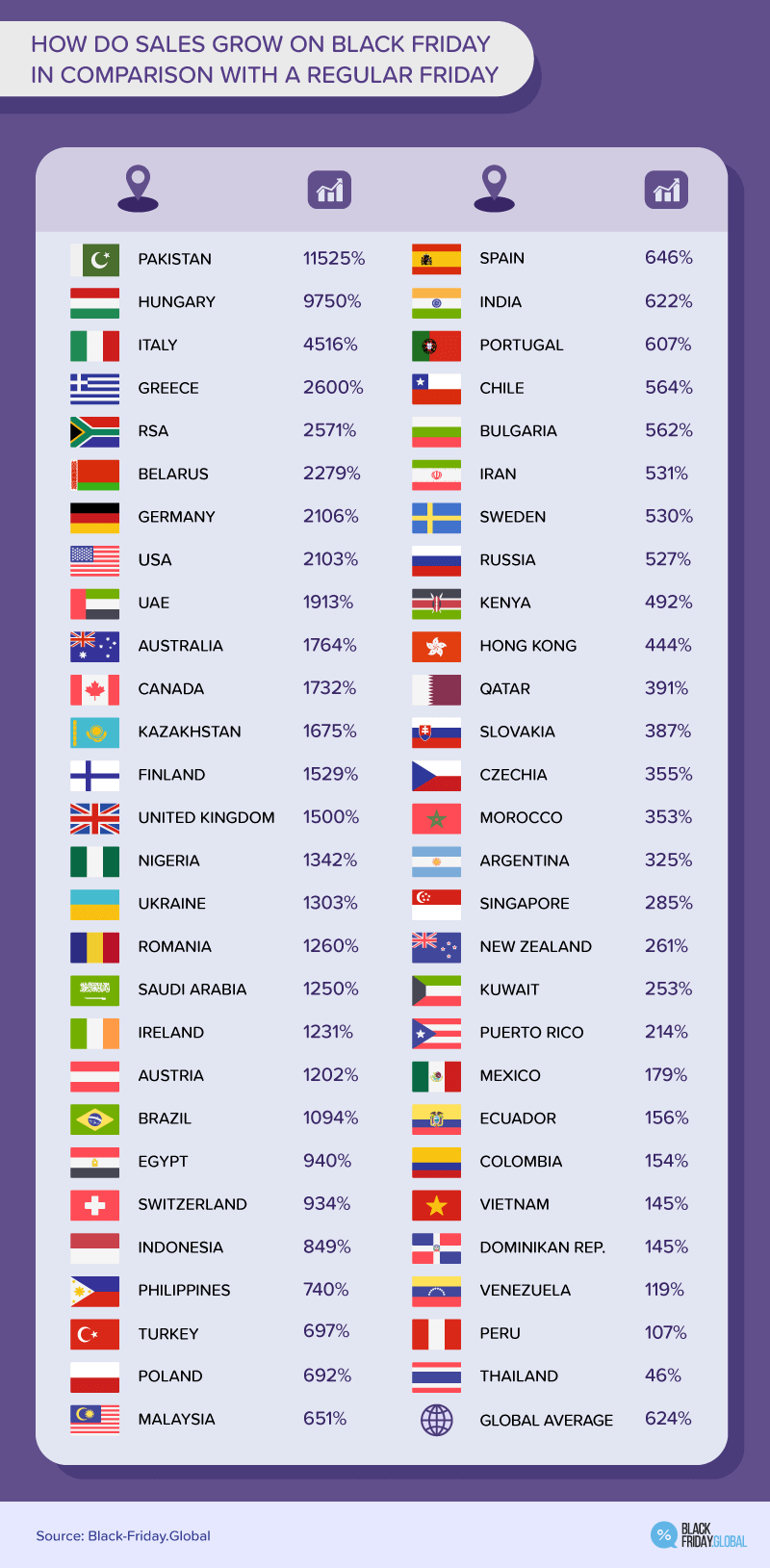
Such a great Black Friday recognition results in sales numbers’ surges each year. In each of the 55 analysed countries, the number of online transactions on Black Friday increased significantly when compared to the regular day. Take Greece for example, where users have made 2600% more purchases than usual or South Africa with 2571% growth in transaction number. However, in no other country, the Black Friday interest was as big as in Pakistan, where users activity was higher by enormous 11,525%.
Unsurprisingly so November is usually the month where most profits are generated. According to certain estimates, around 20% of annual turnover is being made in November. What’s more, our internal data allows us to reevaluate that in certain markets – e.g. the UK, Greece, RSA – where even every third transaction is taking place in November.
Hard Money
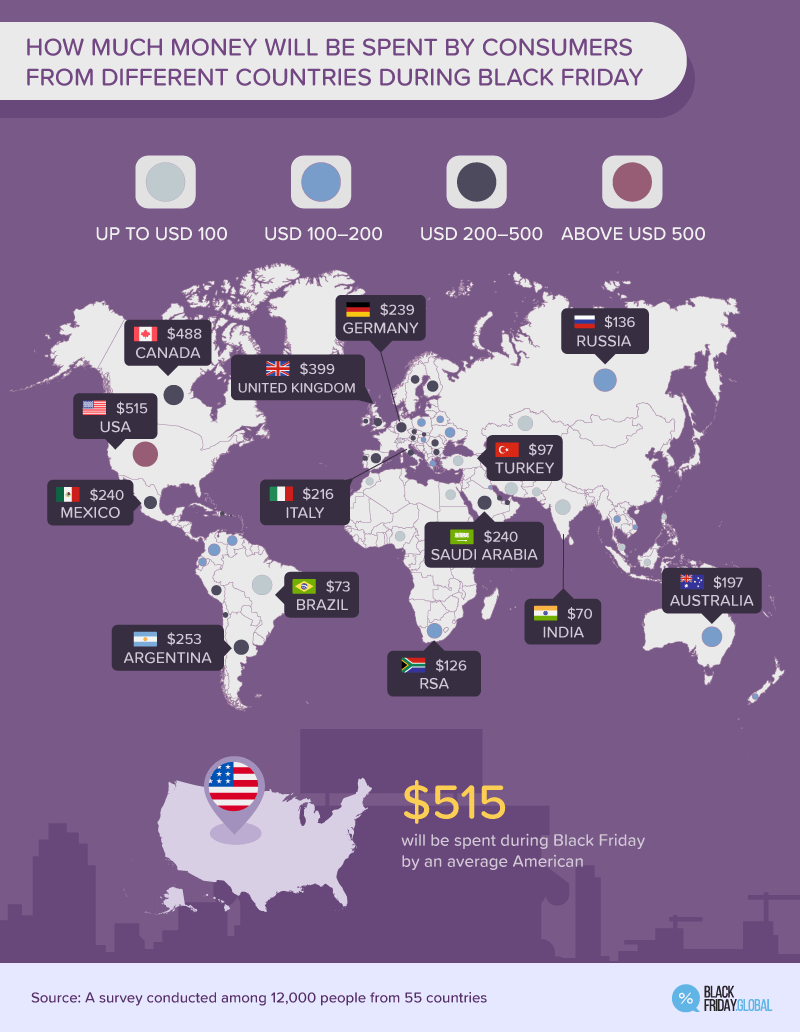
The results of the survey show that users in North America and Europe are willing to spend the most during Black Friday. On the contrary, Asian customers – i.e. in Pakistan, Malaysia, Philippines – are planning to spend relatively small amounts of money.
Average American bargain hunter is willing to pay $515 in total for his/her Black Friday shopping cart. That is over $100 more than British consumers, and $27 more than Canadians.
Pieces of Black Friday Cake
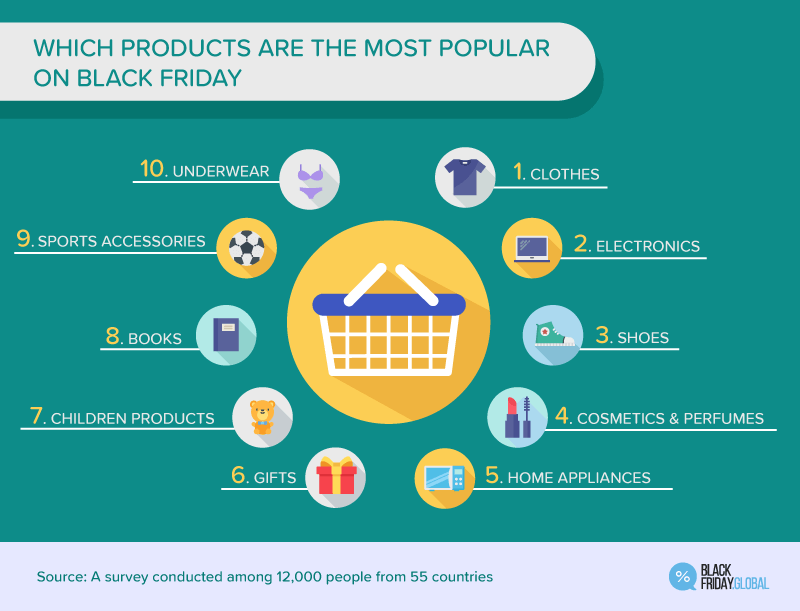
Every year, the world press feeds us with dozens of photos of crowds besieging electronics stores. Surprisingly though, the results of our survey state that clothes, not electronics, are the actual apple of bargain hunters’ eye. Consumer electronics category came second in our ranking. On the other side of the scale books, sports accessories and underwear were the least popular items to buy.
Unusual Markdowns

Black Friday is well known for its discounts reaching as high as 80-90%. Even though the number of items available for a single dollar or with 90% discount is highly limited, those participating in Black Friday can count on legitimate bargains. According to our Black Friday 2017 data, the biggest discounts were available for Americans (68% average markdown), Canadians (66%) and Ukrainians (66%). A little less impressive rebates were found in Russia (58% average markdown), Brazil (57%) and Turkey (56%). World’s average sets around 55% off.
As the average discount in the US online stores reached 68% last year, when forecasting Americans’ Black Friday 2018 expenses, it could translate into $1094 of possible average savings.
Black Friday Figures in America
- 100% of Americans know what Black Friday is, and 75% is willing to participate in the shopping spree this year
- 80% of bargain hunters will choose both online and offline sales
- An average American will spend over $500 during Black Friday sales, with clothes, electronics and shoes on mind
Methodology and Data Sources
This report was created based on data provided by Picodi.com – a global discounts provider existing since 2010. Black-Friday.Global – dedicated to Black Friday deals – was created by Picodi.com. 12,000 participants from 55 countries took part in the survey.
Public Use
Would you like to share the Black Friday insights with your audience? Feel free to use and share the report results and infographics in both commercial and noncommercial way as long as you indicate the authorship of the study (Black-Friday.Global) with a link to this subpage.